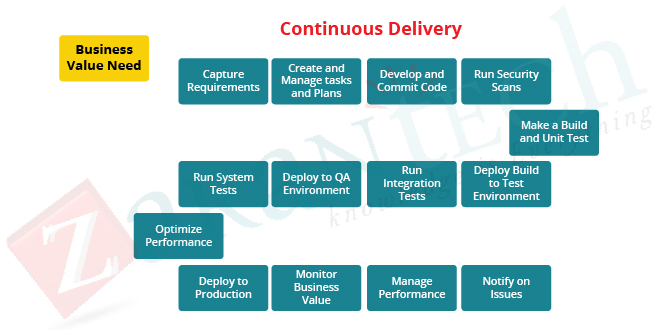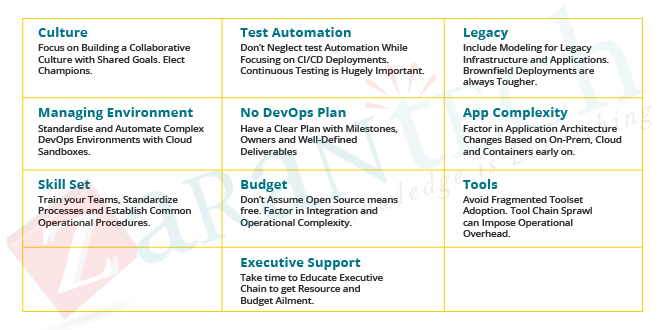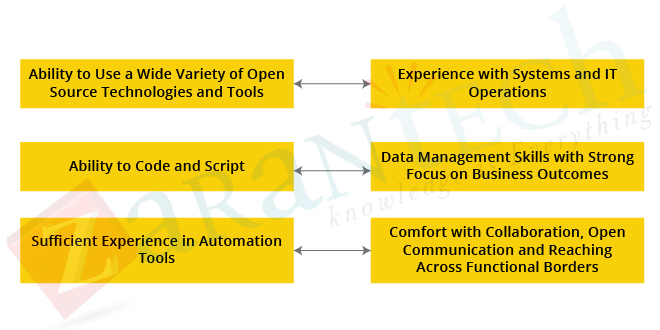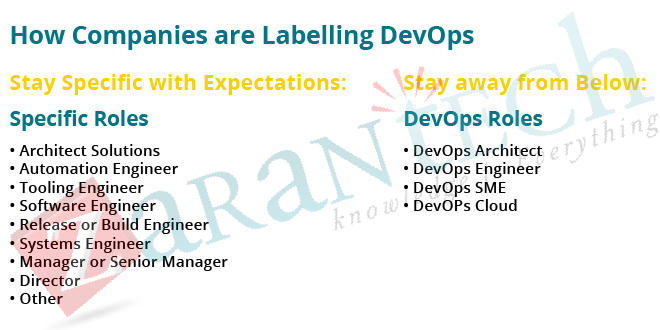Roles and Responsibilities of a DevOps Engineer
Category: DevOps Posted:Oct 24, 2017 By: Serena Josh Every major enterprise in the market tends to depend on critical IT infrastructure that ranges from website to software or application platforms. The DevOps Engineer is responsible for building tools that support such mission-critical infrastructures. DevOps Engineers form the core of the engineering department, and also support deployment of traffic management services and shared infrastructure. Such Engineers also constantly support existing websites and application.
Every major enterprise in the market tends to depend on critical IT infrastructure that ranges from website to software or application platforms. The DevOps Engineer is responsible for building tools that support such mission-critical infrastructures. DevOps Engineers form the core of the engineering department, and also support deployment of traffic management services and shared infrastructure. Such Engineers also constantly support existing websites and application.
Given below is the detailed Process Flow for successful DevOps Delivery, as followed by most enterprises in today’s market:
DevOps staff works hand in hand with various engineering and technical departments to deploy code, provide operational support for fresh software and debugging production hassles. DevOps individuals and teams also function in the troubleshooting of enterprise software.
In terms of authority, DevOps Engineers can exercise critical decisions without extensive oversight or approvals for decisions on resource building, automation processes, tools and a lot more.
Objectives and Responsibilities of a DevOps Engineer
1. Management
The DevOps Engineer ensures compliance to standards by monitoring the enterprise software and online websites. The engineer also regulates tools and processes in the engineering department and catalyses their simultaneous enhancement and evolution. Along with this, they also actively build and enhance platform services including website software and applications. They also host and manage databases.
Given below are the obstacles to implement DevOps and the best practices that can be used to get through them.
DevOps staff also checks and monitor alarms on a periodic basis, detects and analyses root causes. They also deploy preventive processes to stop issue recurrences along with complete ownership and accountability of enterprise web-service performance. While handling capacity planning, they also ensure enterprise software is deployed in scalable architecture.
2. Design and Development
Design and Development of enterprise infrastructure and its architecture is one of the major responsibilities that DevOps Engineers are tasked with. Such Engineers are highly skilled coders which enable them to script tools aimed at enhancing developer productivity.

Automated risk-management techniques are also enabled by such Engineers by designing, testing and deploying the same. He/she will also uphold core infrastructures running the Enterprise’s online practices. Also maintained by these Engineers will be Business’s configuration and deployment tools like Puppet and Terraform.
3. Collaboration and Support
The DevOps’ Modus Operandi is to collaborate extensively and yield results in all aspects of their work. Everything ranging from technical analyses to deployment and monitoring is handled, with the focus to enhance overall system reliability and scalability. The diagram below gives one a clear picture of the values that define DevOps.
They achieve this through periodic and consistent communication and interaction with the IT department in troubleshooting apps and software. They also keep an eye on cost-effectiveness and performance requirement.
4. Knowledge
DevOps staff and Engineers aid in promotion of knowledge sharing and overall DevOps culture throughout the engineering department. They also have to stay on top of industry trends and best practices whilst recognizing opportunities for automation, design development and other solutions in a comprehensive manner to boost operational efficiency.
5. Versatile Duties
DevOps staff and Engineers also take on work delegated by IT director, CTO, DevOps head and more. They will also perform similar duties to the designations mentioned above.
Required Qualifications of a DevOps Engineer
1. Education
A Bachelor’s degree in Computer Science, Information Science and other associated fields are suitable qualifications for this position. Also considered for this position is experience compatible with the fields mentioned above.
Learn DevOps from Our Industry Experts
2. Experience
Experience in development of large scale software solutions in languages ranging from Python, .NET, Java, and JavaScript are the massive advantages for a DevOps Engineer. Also valued would be experience with Cassandra, Elasticsearch, and MySQL. Linux server administration or a deep understanding of Linux/Unix is also very helpful in this case.
Puppet, or Chef or any other configuration management tools will also help in succeeding as a DevOps engineer in the long run. Approaches such as risk-management, clustering, load balancing and failover will also prove useful in this case.
3. Communication and Interpersonal Skills
The cross-domain nature of DevOps by itself requires a thorough set of interpersonal and communication skills. This will ensure greater ease in eliciting and facilitating collaboration efforts amongst neighbouring technical and engineering teams. (Technical) Communication skills are the bread and butter of DevOps individuals so that issues can be resolved quickly before they branch out into further bugs and hitches. And a greater set of interpersonal skills will help in avoiding inter-departmental conflicts and personal grudges.
Conclusion
DevOps is an ideology at its core and can involve Engineers skilled across various domains and departments. As such, DevOps personnel are ever fluid within the organization, taking on many roles at various times to enable creation of efficient enterprise processes and enhancement of the existing ones. If there was ever a time to take on DevOps roles in your current organization this is it!
I hope that by now you have had an overview of DevOps. Before you enroll in ZaranTech’s certification course on DevOps, do check out the DevOps demo:




 99999999 (Toll Free)
99999999 (Toll Free)  +91 9999999
+91 9999999